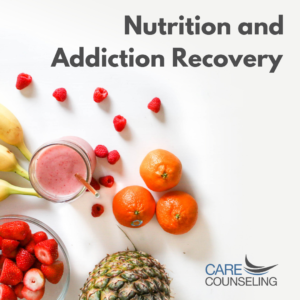Nutrition and Addiction Recovery
 The journey of addiction recovery is multifaceted, encompassing physical, mental, and emotional aspects. Yet, what we eat has a profound impact on our physical and mental well-being. Let’s explore the significant role of nutrition in addiction recovery and how a balanced diet can contribute to a healthier, more stable foundation for those seeking sobriety.
The journey of addiction recovery is multifaceted, encompassing physical, mental, and emotional aspects. Yet, what we eat has a profound impact on our physical and mental well-being. Let’s explore the significant role of nutrition in addiction recovery and how a balanced diet can contribute to a healthier, more stable foundation for those seeking sobriety.
The Impact of Addiction on Nutrition
Before diving into the benefits of nutrition in recovery, it’s essential to understand how addiction can disrupt a person’s dietary habits and overall health:
- Poor Dietary Choices:
– Substance abuse can lead to poor dietary choices, often favoring quick, unhealthy options over nutritious foods. These choices can result in malnutrition, as the body lacks essential vitamins and minerals.
- Nutritional Deficiencies:
– Substance use can deplete the body of vital nutrients, such as vitamin B, vitamin D, and magnesium, leading to a range of health issues.
- Digestive Problems:
– Chronic substance abuse can damage the gastrointestinal system, causing issues like acid reflux, gastritis, and ulcers, which can hinder proper nutrient absorption.
- Weight Fluctuations:
– Substance abuse can lead to extreme weight fluctuations, either through overeating or neglecting meals. These changes can further exacerbate nutritional imbalances.
The Role of Nutrition in Addiction Recovery
- Physical Healing and Repair:
– A balanced diet provides the body with the necessary nutrients for physical healing and repair. This is particularly crucial during early recovery when the body is working to recover from the effects of substance abuse.
– Nutrients like protein, vitamins, and minerals support tissue regeneration and help restore organ function.
- Stabilizing Mood and Energy Levels:
– A well-balanced diet can help stabilize mood and energy levels, reducing the risk of relapse. Nutrient-rich foods promote the production of essential neurotransmitters like serotonin and dopamine, which play a crucial role in mood regulation.
– Stable blood sugar levels also prevent energy crashes and mood swings.
- Stress Management:
– Recovery is often accompanied by high levels of stress and anxiety. Proper nutrition can help mitigate the physical effects of stress by supporting the adrenal glands and regulating cortisol production.
– Foods rich in antioxidants, like fruits and vegetables, combat oxidative stress associated with addiction.
- Cognitive Function:
– Substance abuse can impair cognitive function, including memory and concentration. Nutrient-dense foods, especially those rich in omega-3 fatty acids, support brain health and cognitive recovery.
- Immune System Support:
– Addiction weakens the immune system, making individuals more susceptible to illness. A balanced diet bolsters the immune system by providing the necessary vitamins and minerals for immune function.
Practical Steps for Nutritional Support in Recovery
- Consult a Nutritionist:
– Working with a qualified nutritionist can provide personalized guidance tailored to an individual’s specific needs and dietary preferences.
- Hydration:
– Staying adequately hydrated is essential for physical and mental well-being. Water helps flush toxins from the body and supports various bodily functions.
- Balanced Meals:
– Focus on well-balanced meals that include lean proteins, whole grains, fruits, vegetables, and healthy fats. These provide a spectrum of nutrients essential for recovery.
- Limit Sugar and Processed Foods:
– Reducing sugar and processed food intake can help stabilize blood sugar levels and reduce mood swings.
- Mindful Eating:
– Practicing mindful eating techniques can help individuals become more aware of their body’s hunger and fullness cues, promoting healthier eating habits.
- Supplements When Necessary:
– In some cases, supplements may be needed to address specific deficiencies. Consult a healthcare professional before taking any supplements.
Nutrition plays a pivotal role in addiction recovery, impacting both physical and mental well-being. A balanced diet can support the body’s healing process, stabilize mood, and enhance cognitive function, ultimately contributing to a more successful recovery journey.
Incorporating nutritional awareness and healthy eating habits into the recovery process can empower individuals to take charge of their health, fostering a sense of control and self-care that aligns with their goals of lasting sobriety.



























